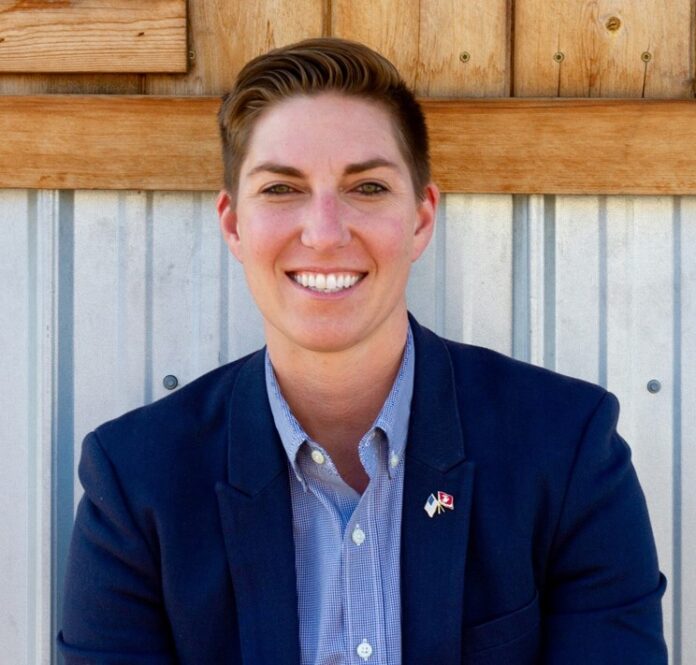Janessa Goldbeck is running for the County Board of Supervisors District 4 seat in the Aug. 15 special election, vacated by the resignation of former supervisor Nathan Fletcher. Goldbeck, 37, is a Democrat running for the nonpartisan seat. From the Talmadge neighborhood in San Diego, Goldbeck has a bachelor’s degree in journalism, minoring in African Studies from Northwestern University, and a master’s degree in public leadership from the University of San Francisco.
Goldbeck, a U.S. Marine Combat Engineer Officer veteran, is the CEO of Vet Voice Foundation, a national nonprofit that provides veterans and military families a larger voice on issue that matter to them. She worked with the Biden administration to secure the largest expansion in veterans health care benefits in 30 years to more than five million veterans nationwide, played a leading role in safeguarding more than 550,000 acres of federal public lands. Locally, she fought for union jobs, equal pay for women, prevention of veteran suicides, services for the LGBTQ community, common sense gun safety measures, affordable and middle-income housing, and services for homeless youth.
Goldbeck serves on the County’s Behavior Health Advisory Board, the board of MANA San Diego, UCSD’s Chancellor’s Community Advisory Group, the San Diego Mayor’s LGBT Task Force, and is past co-chair of the San Diego LGBT Community Center’s board.
Goldbeck said Vet Voice Foundation is an advocacy organization that serves more than 1.5 million veterans and military veterans nationwide.
“Our goal is to elevate their voices in policy debates that impact them,” she said. “We work to influence and pass legislation at the federal, states, and local level.”
Goldbeck said people around San Diego County feel that local politics are not working.
“They look around and they see that the homelessness crisis is deepening, we still do not have the housing we need at every income level, and the cost of living here in San Diego County has made it extremely tough for people to get by, get ahead, so I think there is a lot of frustration and that people want a change. They want something new. They want somebody who is not only going to talk but is actually going to take action.”
Goldbeck said when thinking about the way she has lived her life and career choices she made, there were many instances in where she was told no, you cannot do that and that it is impossible to do.
“I have not accepted the status quo and we have actually been able to change things,” she said. “Whether that was serving in the Marines and found that there were certain jobs I could not do just because I was a woman. I volunteered to go to an all-male school and showed the Marine Corps that women wanted to do those jobs, and I worked as an advocate to change that policy. We did that successfully and opened those jobs to anyone who was qualified to do them.”
Goldbeck said she wants to bring that same mentality to the county when it comes to addressing the homeless crisis, building housing, and creating an economy that works for everyone. She said these are her top three priorities.
Goldbeck said that local government is powerful, but government alone cannot solve all these problems. She said it will require working “hand-in-hand” with state and federal partners.
“First, to ensure that San Diego County gets all the resources it deserves,” she said. “Right now, we get our butts kicked by several other counties across the state when it comes to per capita federal funding. San Diego County is the fifth largest county in the nation, and we need to get our fair share. I am very proud to be endorsed by our current congressional delegation, the majority of our state delegation, because I know it is going to require us working collaboratively with our state and federal partners to bring those resources home and put them to work to actually address these problems at scale.”
Goldbeck said for many years, the County was “relative sleepy place,” and that the pandemic woke people up to how much impact the county government has in their lives.
“We have seen what the county can do when we have engaged leaders who want to put the county’s reserves to work for people and who want to tackle the homeless crisis. Want to help with our county’s behavioral health needs, get more addiction counselors on the streets, and more mental health counselors out in the community. But I think there is a lot of untapped potential, and we need to lean into that. It is not a lack of resources. It is a lack of political will.”
Goldbeck said she does not support SANDAG’s proposed Milage Tax.
“I know the state is pushing some restrictions on us as a county, but I think the reality is that we need to invest in our county infrastructure and increase the frequency of the public transit that we already have,” she said. “And we need to increase the routes out to the parts of the county that are underserviced. At the end of the day, 90% of San Diegans drive. So, we must be able to walk and chew gum at the same time. Putting an additional tax on drivers at a time when many San Diegans are struggling, to me does not make sense. I want to make sure that we are helping working families, seniors on a fixed income, people that need to get to their jobs on time at times when public transportation does not run. So, we need to think about how we continue to expand and strengthen our public transportation system without punishing people who are just trying to get to work or picking their kids up from school.”
Goldbeck said she believes that the county has a much bigger role to play in emergency housing for people who are currently living on the streets. She said that could mean putting up more prefabricated homes that are easy to put up so people can be connected to services, receive treatment, helping relieve the burden on cities that are struggling to meet the needs of emergency overnight shelters. She said utilizing county lands is something she would prioritize as a county supervisor.
“We should prioritize people who are actively seeking to get off the streets,” she said. “Like people over the age of 55, our fastest demographic of homeless in the county, which is completely unacceptable. And of course, families with small children, who are often invisible in this conversation because they might be living in their cars or living with a relative or family friend.”
Goldbeck said the county needs housing at every level, and the most expensive part of housing is land.
“We are seeing some very interesting and innovative ideas coming out of San Diego Unified School District,” she said. “They are building workforce housing for their teachers, janitors, and administrators on their own land.”
“I would love to see the county follow suit and build workforce housing for the thousands of county employees using the land that we already have.”
Goldbeck said the Board has oversight over thousands of employees that have contracts with the county.
“Many of those folks cannot afford, even with their wages, to live here,” she said. “I currently sit on the County’s advisory board where we hear directly from the director of Behavioral Services about the status of their hiring need, their shortages. These are the people on the front line tackling the homeless crisis, mental health and addiction crisis, and it is estimated that we are going to need 18,000 new behavioral health workers in the next decade. It starts with us offering competitive pay and benefits so that we can recruit and retain experienced individuals to meet that need.”
Goldbeck said one thing she is committed in doing is declaring a poverty emergency in San Diego County.
“This is an issue that does not get a lot of air time, but there are many kids in our county that do not get proper nutrition, who are bouncing around for shelter, experiencing housing insecurity. Declaring a poverty in San Diego County is not just about saying that. It is about unleashing resources to be able to help struggling families, give their kids a good start in life, and ensure that families can stay together, and kids can remain in school.”














